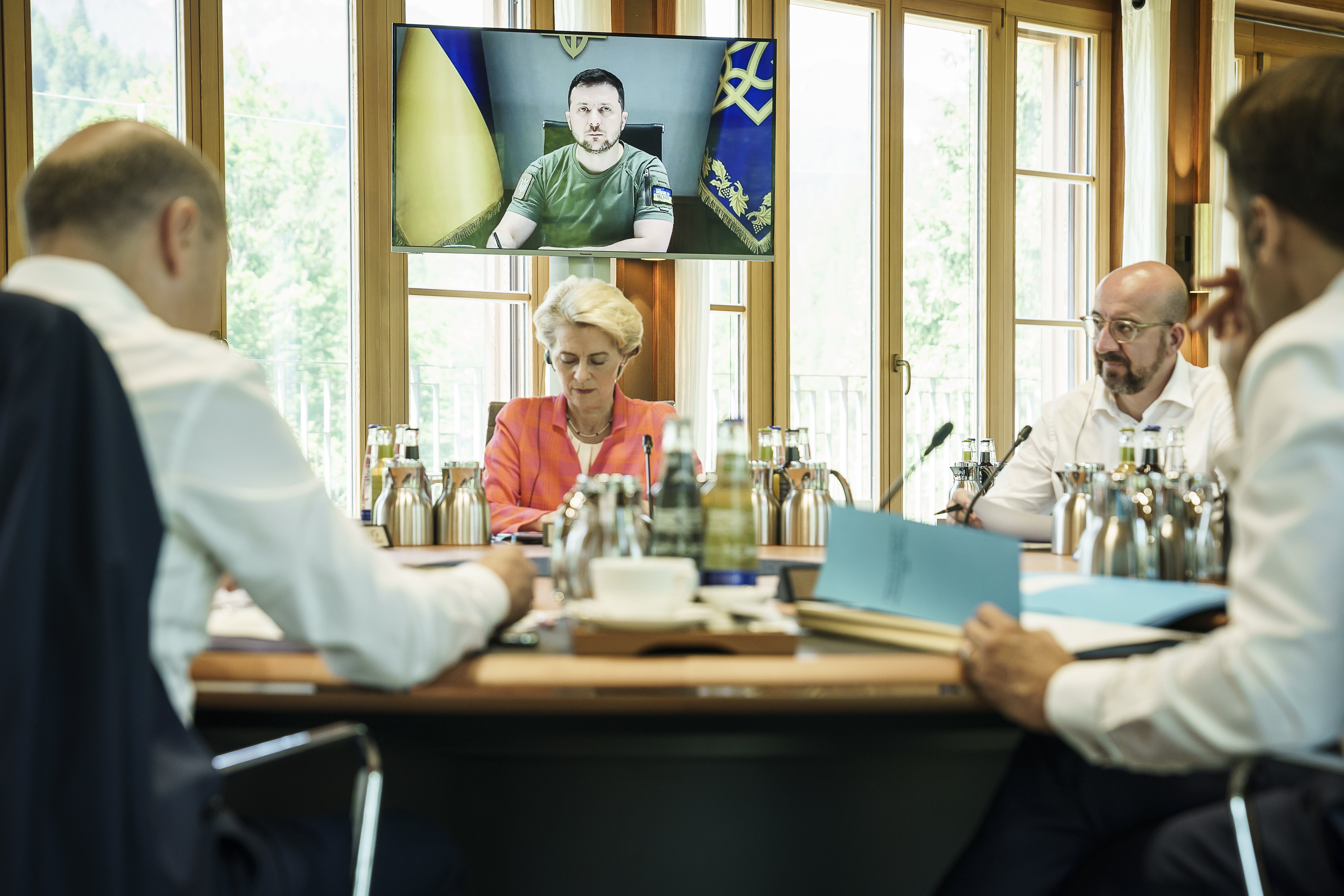Zelensky tells G7 he wants Ukraine war over by end of 2022, as leaders back him ‘for as long as it takes’
Ukrainian leader does not want conflict to drag on through winter
Ukrainian president Volodymyr Zelensky has told G7 leaders that he wants the war with Russia over by the end of 2022.
Mr Zelensky addressed the leaders of the UK, US, Canada, France, Germany, Italy and Japan by video link on Monday, urging them to provide more weapons for the struggle against Vladimir Putin’s forces.
The Ukraine leader also said he was keen to see the war to end this year – telling G7 allies not to let the conflict “drag on” through the winter, The Independent understands.
But in a sign that he was not willing to back down and accept a peace deal that gave up swathes of Ukraine, the president said: “We will only negotiate from a position of strength.”
Mr Zelensky told the G7 he was focused on securing an “advantageous position” in a matter of months rather than years, US national security adviser Jake Sullivan said after the session.
The G7 released a statement after discussions with Mr Zelensky saying it would continue to provide financial, military and political support for Ukraine “for as long as it takes”.
It comes as NATO will massively increase the number of its forces on high alert – from around 40,000 to over 300,000 troops, secretary-general Jens Stoltenberg announced on Monday.
Mr Stoltenberg did not say how much each NATO country might contribute to the plan to expand the number of troops on “high readiness” in response to ongoing Russian attacks on Ukraine.
He indicated that the new structure would see NATO partners such as the US, UK and France pledge units, ships and warplanes to be ready to deploy to specific territories on the alliance’s eastern borders.
The NATO leader also said the plan to boost would “significantly reinforce” deployments already in eastern European countries close to Russia.
The G7 statement on Ukraine said it was up to Ukraine to decide on a possible future peace deal. It said Kyiv must decide on any settlement “free from external pressure or influence”.
Boris Johnson’s team had been keen to see language about a long-term commitment to Ukraine amid fears France and some other countries were suffering from “fatigue”.
French president Macron was criticised for negotiating with Mr Putin at the start of the invasion and saying Russia must not be “humiliated”, raising fears Ukraine could be pushed into giving up territory.
But a French official said Mr Zelensky had indicated he wanted to negotiate an end to the war – so long as he can gain a stronger military position.
“His goal is to end the war as quickly as possible and to get out of it in the best possible position, so that he can negotiate from a position of strength,” the diplomat told Reuters. “He will negotiate when he will be in a position to do so.”

It comes as a Russian missile hit a crowded shopping centre in the Ukrainian city of Kremenchuk, president Volodymyr said.
The leader claimed that more than 1,000 people were in the shopping centre at the time of the attack. He gave no immediate details of casualties but said: “It is impossible to even imagine the number of victims.”
The G7 is also expected to agree plans for a price cap on Russian oil during the three-day G7 summit in the German Alps. One US official said on Monday that a deal was “close”.
The details of how a price cap would work, as well as its impact on the Russian economy, are to be resolved by G7 finance ministers in the coming months, according to the official.
President Joe Biden is also set to announce the purchase of an advanced surface-to-air missile system for Ukraine. The US is purchasing NASAMS, a Norwegian-developed system, to provide medium to long-range defence, according to AP.
The largest democratic economies will also commit to raising tariffs on Russian imports to their countries, with the US announcing new tariffs on 570 categories of goods, as well as use of sanctions to target Moscow’s defence supply chains.
Mr Biden is also announcing a £6.1bn commitment to help Ukraine’s government meet its expenses, as part of a previously announced £32bn military and economic aid commitment.




Join our commenting forum
Join thought-provoking conversations, follow other Independent readers and see their replies
Comments